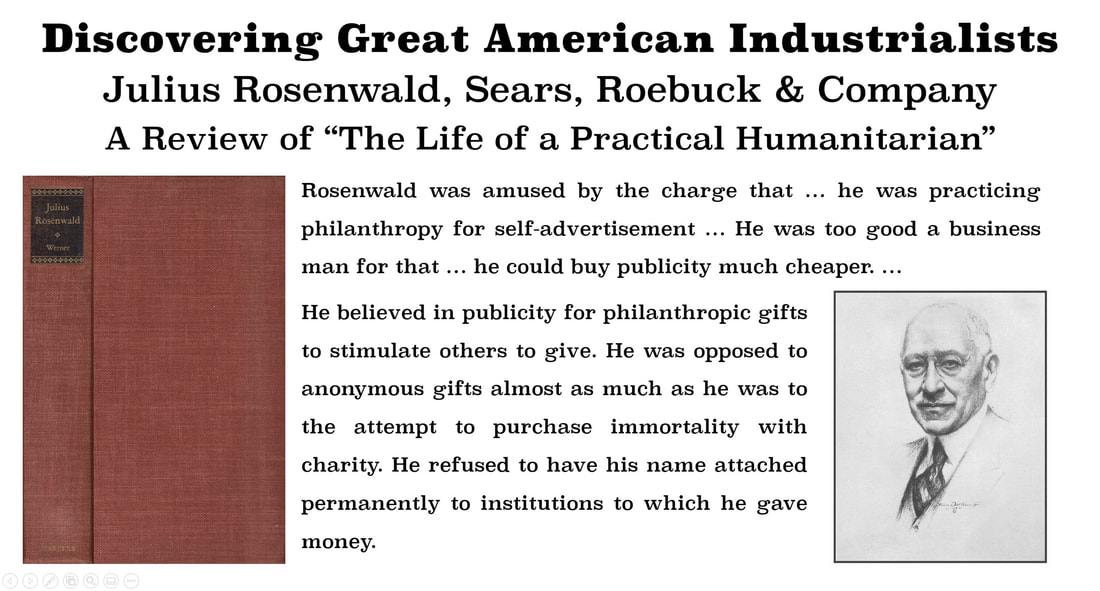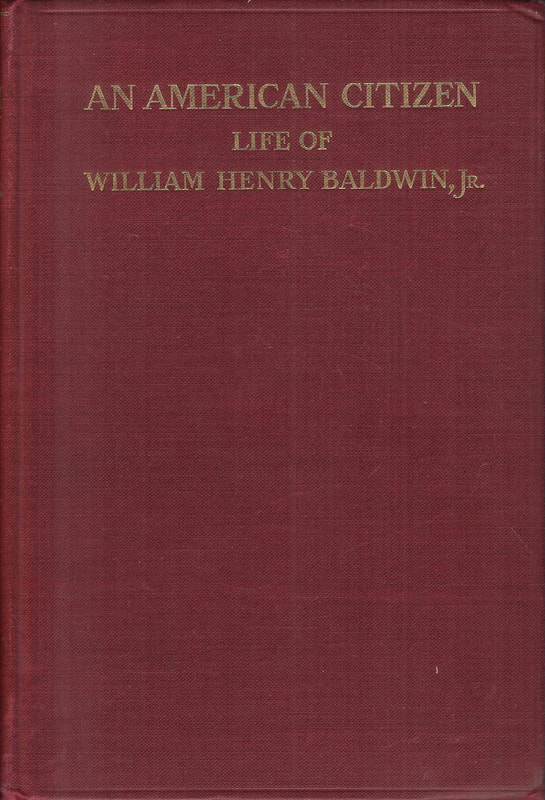A Review of "The Life of a Practical Humanitarian"
|
|
Date Published: June 25, 2021
Date Modified: June 30, 2024 |
In the first place [Julius Rosenwald once said] philanthropy is a sickening word. It is generally looked upon as helping a man who hasn't a cent in the world. That sort of thing hardly interests me. I do not like the "sob stuff" philanthropy. What I want to do is to try and cure the things that seem to be wrong. I do not underestimate the value of helping the underdog. That, however, is not my chief concern, but rather the operation of cause and effect.
I try to do the thing that will aid groups and masses rather than individuals.
I try to do the thing that will aid groups and masses rather than individuals.
W. R. Werner, Preface to Julius Rosenwald: The Life of a Practical Humanitarian
A Review of "Julius Rosenwald: The Life of a Practical Humanitarian" by Werner
- Reviews of the Day: 1939
- Selected Quotes from "Julius Rosenwald: The Life of a Practical Humanitarian"
- This Author’s Thoughts and Perceptions
Reviews of the Day: 1939
This excellent biography describes not only his [Julius Rosenwald's] virtues but his mistakes.
The Cincinnati Enquirer, December 23, 1939
Education, the Negro and his problems, Jewish resettlement projects, and public health are some of the subjects which engaged Rosenwald's philanthropic interests. Mr. Werner writes in detail about all these, especially the Negro benefactions. And this is an aspect of Rosenwald's life which affects Georgia and the south in particular. The new vice chancellor of the University System of Georgia, it will be recalled, came to his new position as director of this phase of the work of the Rosenwald Foundation.
John E. Drewry, New Book News, The Atlanta Constitution, August 11, 1940
Selected Insights from "The Life of a Practical Humanitarian"
- When Rosenwald first entered the mail-order business its standard of integrity was not considered high in the business world. By his insistence that goods must be exactly as represented, he and his associates raised the level of that business. … After Sears had retired from the presidency of the company in 1909, Julius Rosenwald, the new president, called a meeting of the department managers. He told them that from then on the mail-order catalogue was to contain statements which were not only restrained and truthful, but which would also give customers a clear impression of the exact content of the goods they might wish to order.
- In his business, he never had any use for windy ostentation, and he was always accessible to anyone in the organization who had anything to say to him. He was kindly to his associates, but not sentimental in his business dealings. He did not favor enormous salaries for his executives, nor did he pay more than the prevailing rate of wages to the thousands of men and women and boys and girls who worked in the mechanical jobs. … For the company's laboring thousands, he and his associates later developed one of the best profit sharing systems ever inaugurated in the United States, and they also introduced health and recreational benefits for the employees.
- He was a man who was so impatient of anything that he disapproved of, that he had the impulse to remedy it, and in small matters he could get into purple rages with business associates and intimates who crossed his wishes.
- To help men who were working hard to raise themselves out of discouraging depths was always a great satisfaction to Rosenwald, and he loved to help individuals and institutions when he could do so without destroying their self-reliance.
This Author's Thoughts and Perceptions
I found Mr. Rosenwald very human and very logical, but almost too practical to an extreme.
Julius Rosenwald: The Life of a Practical Humanitarian lives up to its title. Mr. Rosenwald is portrayed in every respect as practical whether it is in business in only paying competitive wages at Sears, Roebuck & Company or in his philanthropy to very worthwhile causes that are innumerable in a short review.
Even when he was moved with sentiment to right an existing wrong, he sought others to match his funds. He preferred making a change permanent rather then only providing temporary relief with a donation. He did not want to lift a person from poverty, but enable the man or group of individuals to lift themselves. Reading this I remembered my father's advice when he was teaching at a local vocational school, "It is better to teach a starving man how to fish rather than to just give him a fish." Practical, yes?
At the time of Julius Rosenwald's death Thomas J. Watson Sr. wrote the following in an editorial entitled, "Julius Rosenwald, Distinguished Merchant."
Even when he was moved with sentiment to right an existing wrong, he sought others to match his funds. He preferred making a change permanent rather then only providing temporary relief with a donation. He did not want to lift a person from poverty, but enable the man or group of individuals to lift themselves. Reading this I remembered my father's advice when he was teaching at a local vocational school, "It is better to teach a starving man how to fish rather than to just give him a fish." Practical, yes?
At the time of Julius Rosenwald's death Thomas J. Watson Sr. wrote the following in an editorial entitled, "Julius Rosenwald, Distinguished Merchant."
Julius Rosenwald, the distinguished Chicago merchant and philanthropist, whose death this week caused a wave of sadness to sweep the world, exemplified the potentialities of American youth. Born in rather less than moderate circumstances, he rose to be one of the most respected citizens of his era. His wise philanthropies have done much to improve the condition of the peoples of the world, especially those of this country. …
IBM … feels the deepest regret at the passing of an individual whose influence stands as a landmark of education, humanitarianism, and business progress.
One of the more important insights from this book was the impression how different individuals can view philanthropy in so many different ways.
|
Rosenwald felt that these two books influenced him more than anything else he had ever read. Images link to reviews.
|
- George Eastman gave away anonymously. He only disclosed his philanthropy when it was required by law. He used the moniker "Mr. Smith" to encourage other donations to MIT [A Slice of Life Story: George Eastman]. Julius Rosenwald let his donations be widely known underneath his own name to encourage other donations and donors.
If one believes in diversity of thought, these three men exemplify a reasonable diversity in their handling of their money while still motivated to right wrongs or redistribute wealth.


